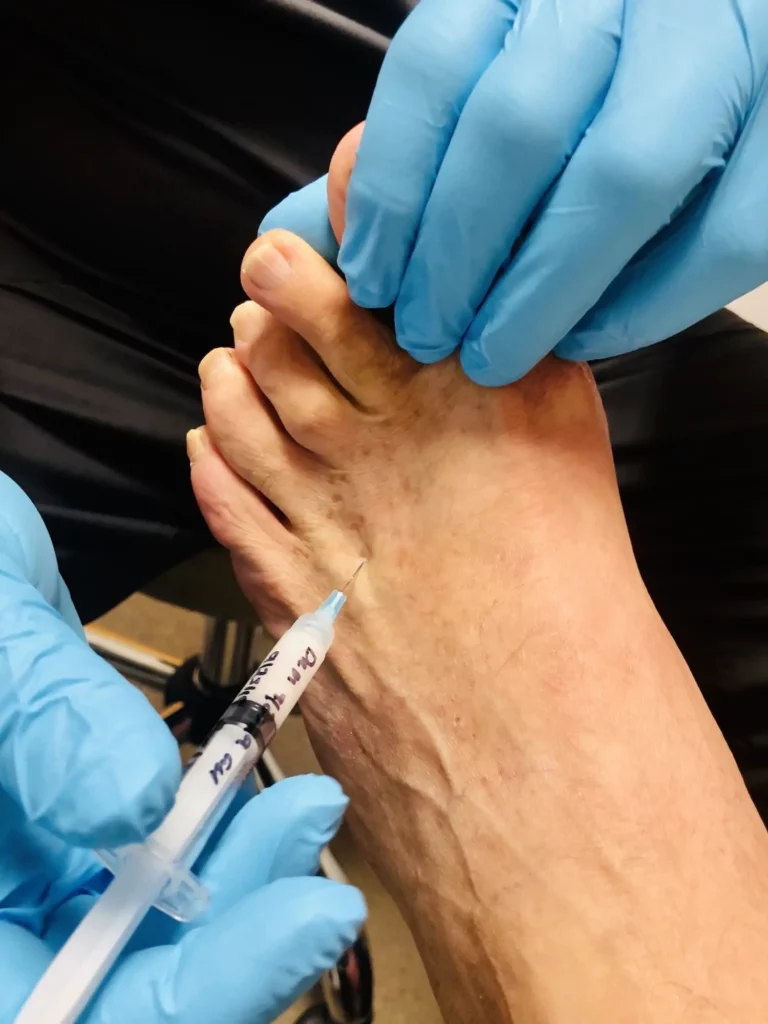STEROID INJECTIONS
Experience relief from foot discomfort through our specialised steroid injections, offering a swift and effective solution, especially for inflammatory conditions and arthritis. Step back into comfort and ease with our treatment.

Services
WHAT ARE STEROID INJECTIONS?
At MyFootMedic, we offer steroid injections as a minimally invasive treatment option for various foot and ankle conditions. Steroid injections, also known as corticosteroid injections, involve the delivery of a potent anti-inflammatory medication directly into the affected area.
This treatment is commonly used to alleviate pain, reduce inflammation, and improve mobility in patients with foot and ankle issues. In the majority of cases, ultrasound imaging is used during the injection to ensure that the steroid is accurately deposited into the intended location.
WHAT DO STEROID INJECTIONS TREAT?
Steroid injections, also known as cortisone injections, are used to address various foot and ankle conditions. Some of the conditions that can be effectively treated with steroid injections include:
Plantar Fasciitis:
Commonly used to alleviate pain and inflammation associated with plantar fasciitis, a condition characterised by heel pain.
Morton’s Neuroma:
Steroid injections can help relieve discomfort and reduce swelling and inflammation along the nerve in cases of Morton’s Neuroma.
Tendonitis:
Inflammation of the tendons in the foot can be effectively addressed with corticosteroid injections to reduce pain and swelling.
Arthritis:
Steroid injections can provide relief for painful arthritic joints in the foot, helping to manage the associated discomfort and inflammation.
These are just a few examples of the podiatric conditions that can be treated with steroid injections. It’s important to consult with your podiatrist to determine if steroid injections are an appropriate treatment option for your specific foot or ankle ailment.
HOW WILL STEROID INJECTIONS HELP ME?
Steroid injections can offer significant relief for individuals experiencing foot and ankle pain and inflammation. Here’s how steroid injections may benefit you:
Pain Relief
• Reduction of Inflammation
• Alleviation of Discomfort
Improved Mobility
• Enhanced Range of Motion
• Enhanced Functionality
Non-Surgical Treatment Option
• Minimally Invasive
• Localised Treatment
Quick Recovery
• Minimal Downtime
• Rapid Onset of Relief
HOW DO STEROID INJECTIONS WORK?
Steroid injections are a common treatment method used in podiatry to alleviate pain and reduce inflammation in the foot and ankle. Here’s how they work:
Anti-Inflammatory Properties:
Steroids have potent anti-inflammatory properties. When injected into the affected area, they help to reduce inflammation caused by conditions such as plantar fasciitis, arthritis, or tendonitis.
Pain Relief:
By reducing inflammation, steroid injections can effectively alleviate pain in the foot and ankle. This can greatly improve mobility and overall comfort for individuals suffering from chronic foot pain.
Precision Targeting:
Podiatrists are able to precisely target the site of inflammation using ultrasound imaging, ensuring that the steroid medication is delivered directly to the affected area for maximum effectiveness.
Temporary Relief:
It's important to note that steroid injections provide temporary relief and are often used in conjunction with other treatment modalities such as physical therapy, orthotics, or exercise regimens.
Caution and Monitoring:
While steroid injections can be highly effective, they are not without risks. Podiatrists carefully assess each patient's condition and medical history before recommending this treatment. Additionally, regular follow-up appointments may be necessary to monitor the patient's response and any potential side effects.
These are just a few examples of the podiatric conditions that can be treated with steroid injections. It’s important to consult with your podiatrist to determine if steroid injections are an appropriate treatment option for your specific foot or ankle ailment.
LET'S ANSWER YOUR STEROID INJECTION QUESTIONS!
After a steroid injection into the foot, it’s common for your Podiatrist to recommend a period of 24 hours rest with your foot elevated. It is advised not to participate in any strenuous or high impact activities for the first week following a steroid injection. It’s important to follow the post-injection care instructions provided by your Podiatrist to ensure the best outcome and minimise any potential discomfort. If you have any concerns about walking after a steroid injection, it’s best to discuss them with your Podiatrist.
The duration of relief from a steroid injection can vary from patient to patient. Some individuals experience significant pain relief that lasts for several months, while others may find relief for a shorter period. It’s important to note that steroid injections are intended to provide temporary relief from inflammation and pain, rather than a permanent solution, they are usually combined with other treatment modalities such as orthotics. The effectiveness and duration of the injection can be influenced by factors such as the specific condition being treated, individual health characteristics, and lifestyle factors. If you are considering a steroid injection for foot pain, it’s best to consult with your Podiatrist to understand the potential duration of relief based on your unique circumstances.
The experience of pain during a steroid injection into the foot can vary from person to person. Some individuals may experience mild discomfort or a brief stinging sensation at the injection site, while others may find it more uncomfortable. To minimise any potential discomfort, your Podiatrist may use a local anaesthetic to numb the area before administering the injection. Additionally, they may employ techniques to make the procedure as comfortable as possible. It’s important to communicate any concerns about pain with your Podiatrist so that they can address them and ensure your comfort during the procedure.
While steroid injections into the foot are generally safe and effective, there are potential risks to be aware of. These may include temporary pain or discomfort at the injection site, a slight risk of infection, thinning of the skin or soft tissues at the injection site, discolouration of the skin, and very rarely, damage to nearby nerves or tendons. It’s essential to discuss the potential risks and benefits of steroid injections with your Podiatrist before undergoing the procedure. Your Podiatrist will carefully evaluate your medical history and current condition to minimise these risks and ensure the safest and most effective treatment for your foot condition.
If a steroid injection into the foot does not provide the expected relief, your Podiatrist may recommend alternative treatments based on your specific condition. These may include physical therapy, orthotic devices, non-steroidal anti-inflammatory medications, or other minimally invasive procedures. In some cases, further diagnostic tests may be conducted to re-evaluate the underlying cause of the foot pain. Your Podiatrist will work closely with you to develop a personalised treatment plan tailored to your needs, with the goal of alleviating your foot discomfort and improving your mobility.
STEROID INJECTIONS FROM MYFOOTMEDIC IN BEDFORD
If you’re seeking relief from foot pain, look no further. Our skilled podiatrists at the Bedford clinic specialise in providing swift and efficient treatment for your discomfort.
Get in touch with the MyFootMedic team today to explore the benefits of steroid injections in alleviating your foot pain. Take the first step towards a pain-free life.



